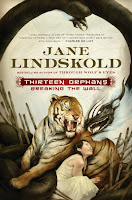 When I was first beginning to learn how to play mah-jong I also took the opportunity to seek out fiction that featured the game in some way. Understandably, there is much more available in Japan, Hong Kong, China and other regions in Asia that have a prominent mah-jong culture than there is available in the United States; I actually had a hard time finding any. Happily, I discovered Jane Lindskold's series Breaking the Wall, which was pretty much exactly what I was looking for. I had previously come across the first book in the series, Thirteen Orphans, while browsing at the library but at the time I didn't realize what it was, although the title seemed strangely familiar to me. There was a good reason for that; "Thirteen Orphans" is also the name of a limit hand common to many variations of mah-jong, including Riichi, the style that I play. Anyway. Once I figured out the connection to mah-jong I went out and found a copy of my own which I was able to get signed while at the American Library Association Annual Conference in 2010.
When I was first beginning to learn how to play mah-jong I also took the opportunity to seek out fiction that featured the game in some way. Understandably, there is much more available in Japan, Hong Kong, China and other regions in Asia that have a prominent mah-jong culture than there is available in the United States; I actually had a hard time finding any. Happily, I discovered Jane Lindskold's series Breaking the Wall, which was pretty much exactly what I was looking for. I had previously come across the first book in the series, Thirteen Orphans, while browsing at the library but at the time I didn't realize what it was, although the title seemed strangely familiar to me. There was a good reason for that; "Thirteen Orphans" is also the name of a limit hand common to many variations of mah-jong, including Riichi, the style that I play. Anyway. Once I figured out the connection to mah-jong I went out and found a copy of my own which I was able to get signed while at the American Library Association Annual Conference in 2010.Hidden in the tiles of the game of mah-jong, twelve exiles from the Lands Born of Smoke and Sacrifice have recorded and encoded their magic. The Twelve, along with the only surviving heir to the emperor's throne--who they smuggled out from the Lands during their flight--make up the Thirteen Orphans. Their powers are inherited from one generation to the next, but over the years some have forgotten their heritage and traditions. Many generations have passed and the Twelve once again are being threatened by a power from the Lands. One by one, the Twelve are being attacked, all memories of who they really are and their abilities stolen away. The few remaining draw together, the older generation teaching the younger in hopes that they can identify and eliminate the danger and undo the damage that has been done.
Lindskold begins to explore some marvelous concepts and there is some wonderful world-building in Thirteen Orphans. I absolutely loved the use of mah-jong as part of a magic system and the creation story of the Lands Born from Smoke and Sacrifice. A basic knowledge of Chinese mythology, particularly regarding the zodiac, and mah-jong is useful when reading Thirteen Orphans, but it is not necessary since Lindskold incorporates the important elements seamlessly into her storytelling. Even though there is a distinct Chinese flavor to Thirteen Orphans, the cast of characters remains fairly diverse in regards to their age, ethnicity, background, and knowledge of the situation. However, I never really connected particularly well with any of the characters or felt much attachment towards them except maybe for Foster. But still, I liked the characters and their stories at least in theory. Thirteen Orphans is a slow book and except for a few select scenes there is very little action. Instead, Lindskold spends much of the time establishing the setting and backstory--and there is a lot to explain. I found it to be very interesting, but others might not be so patient. The story doesn't really start to take off until well into the second half of the book, and even then it is more of a cerebral fantasy.
Overall, I did enjoy Thirteen Orphans and Lindskold was a delight to meet in person. The book does demand a reader's full attention and it's not really something that can be skimmed through; important information is sometimes only mentioned once and is easy to miss. The prose is sophisticated although occasionally stilted and while the sentences aren't long, they are complex. While some details, plot and otherwise, are thoroughly explained in Thirteen Orphans--the magic system is very solid, for one--others are left more vague. I assume that these will be further explored in later books, and I look forward to learning more about the Breaking the Wall world. Thirteen Orphans works alright on its own but I think it probably serves better as an introduction to the series as a whole since not much really happens in it. It certainly sets up for the next book, Nine Gates, quite nicely and I hope that the pace will pick up from there.
No comments:
Post a Comment